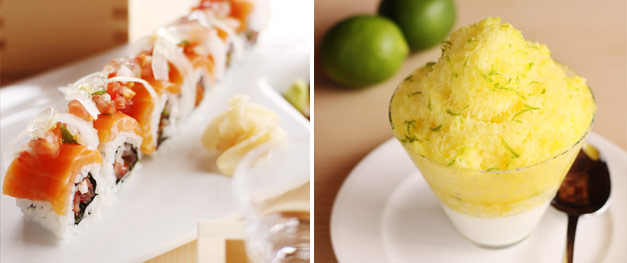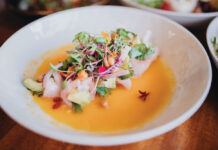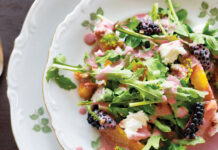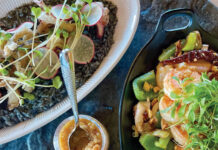
I can relate. It’s the same experience I had after tasting Wong’s signature pineapple shave ice, a ginger-marinated frozen pineapple that is micro-planed over Hawaiian vanilla panna cotta, liliko‘i (passionfruit) sauce, and haupia (coconut pudding) sorbet. The light-as-new-fallen-snow pineapple disappeared in my mouth, cleansing my palate with a sensation that refreshed without being too sweet. It’s one of the more clever things I’ve ever eaten, and like so many items on Amasia’s menu, could only have been conjured by someone with brilliant taste buds.
Once Wong began sampling flavors and foods in culinary school, lightbulbs went on, igniting what he admits is his greatest attribute Hawaii Celebrity Chef Alan Wong, New Amasia Restaurant in Wailea extraordinary curiosity. The kitchen soon became this lifelong tinkerer’s laboratory.
Using a method he calls “slot in/slot out,” Wong began trading ingredients in traditional recipes with those more reflective of the terroir of his multicultural childhood.
His talents landed him a stint at Lutece in New York City (considered one of the best restaurants of its time), working under the tutelage of the famed chef Andre Soltner. Wong returned to Hawai‘i armed with an expanded culinary education and became one of the founding members of Hawai‘i Regional Cuisine. Soon he was known for his East-meets-West, pan-Pacific fare, made from island ingredients and using classical techniques.
While on the Big Island, helming the successful Canoe House restaurant, Alan Wong formed relationships with island farmers like Richard Ha, helping to put a number of burgeoning businesses on the map decades before sustainability became a buzzword. Many of the local producers Wong turned to in the nineties still supply the chef with treasured ingredients – though he’s always on the hunt for new local suppliers, and even has a business “forager” on the payroll.
“What’s great about having smaller restaurants is that we can buy from the farmer [who is] just starting out a pound here and there – without their having to ramp up production too quickly, which would jeopardize the essence of small farming. It makes me happy to feel I’ve played a significant role in encouraging many startup enterprises,” Wong says, beaming with pride.





